News From the Top
President’s Message
Greetings PSWA Members,
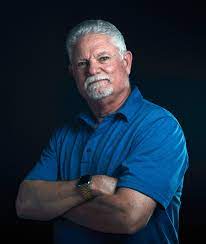 For those of you who haven’t met me, my name is Steve Ditmars, and I’m the new PSWA president. Last year, I was vice-president. My focus then and for the coming year is on financial solvency and improving the member experience.
For those of you who haven’t met me, my name is Steve Ditmars, and I’m the new PSWA president. Last year, I was vice-president. My focus then and for the coming year is on financial solvency and improving the member experience.
Like so many other sectors of society, PSWA revenues over the past few years have not kept pace with inflation. Costs have risen, and we will have to make some adjustments to keep up. That said, our organizational goal will continue to be: Writers working to make writers better.
Last year, Vicki Weisfeld led a committee to rethink our website and how it could be more useful to members, a more effective tool in attracting new members, easier to maintain, and more secure. The Board worked on a set of requirements and has selected a vendor who is hard at work. Ever cost-conscious, we structured the project to be completed in stages, over a couple of years. That will avoid a big budget hit in any single year, given our current tight financial situation. One of our Board members suggested we try a “crowdfunding” exercise for the Web project, and I made the pitch to the members at the conference, with a follow-up email to everyone. So far, we have raised almost $3500! This is so gratifying, because it shows the members value this initiative as much as the Board does.
Our 20th PSWA Conference was a rousing success. Every Board member contributed, and the attendee evaluations are reported below. They included several excellent suggestions, which we will take into account for next year. Michael Black did his usual fantastic job organizing everything. After the conference, he announced that, after a number of years in the demanding conference coordinator role, he is stepping down. I have said it before, but I’ll repeat it: He has my personal thanks and that of every conference attendee from 2025 and years past for all his hard work making PSWA Conferences so successful.
This is a tough role, but Kelli Peacock, Barbara Hodges, and Thonie Hevron have volunteered to plan PSWA Conference Number 21 and are already at work. We wish them well; they have big shoes to fill.
Steve Ditmars
President PSWA
 Vice-President’s Report
Vice-President’s Report
Fall is upon us. In the Northeast, it already feels cooler, and we had a hurricane that churned up waves and winds in the Atlantic. No dog days of summer here.
I am the newly appointed Vice-President of the PSWA in charge of membership. We continue to grow, and after the conference, we gained three new members.
Let’s continue to spread the word about what a great organization the PSWA is.All the best in your writing and in life,
Darlene Record
Vice-President, PSWA
Conference Chair’s Report
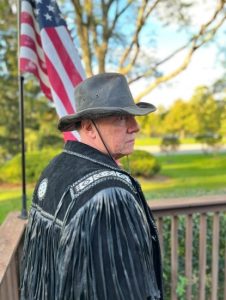 The Roaring Twentieth, our 20th annual PSWA Conference, is now history, and if I might say so myself, it was one of the best ever.
The Roaring Twentieth, our 20th annual PSWA Conference, is now history, and if I might say so myself, it was one of the best ever.
Opening remarks about the PSWA and this year’s conference were given by our outgoing President, Colin Conway, who then handed the reins over to the new president, Steve Ditmars. Steve acted as master of ceremonies, with an occasional assist from the co-master of ceremonies and obstreperous timekeeper, me.
Reading a poem in honor of the law enforcement officers and other public safety officers who have lost their lives in the line of duty has become a standard part of our conference, and Kellie Peacock read “Too Many Lives,” from award-winning poet, Joe Haggerty’s book, A Vice Cop’s Poems of the Street. On Saturday, Barbara Hodges read “The Child With the Outreached Hands,” a poem commemorating those lost on September 11th, written by long-time PSWA member and another award winning poet, Keith Bettinger.
We then presented this year’s PSWA Appreciation Awards to Austin Camacho, Scott Ellis, Josh Lee, Bob Doerr, Mike Brandt, Pete Klismet, Vicki Weisfeld, and, though I’ve never been a fan of self-aggrandizement, I was honored to receive the award this year too.
Expert Panels
Over the course of the next two and a half days, we had eleven panels on distinct topics vital to public safety fiction:
- “Mastering the Craft of Writing,” with Austin Camacho, Karen Phillips, Thonie Hevron, Frank Zafiro, and George Cramer
- “Shooting Investigations: the Good, the Bad, and the Ugly,” with Steve Davis, Josh Lee, Julie Callahan, Bill Powers, and Terrence Dwyer
- “Tiptoeing on the Wild Side,” or, sidling up to the horror genre, with Allen Grimes, David Knop, John Schembra, Kelli Peacock, and E. Roche
- “From Fistfights to Gunfights, How to Write It Right,” with Robert Ryan, Dave Freedland, Dean Cobet, Frank Zafiro, and Colin Conway
- A publisher’s panel featuring Scott Ellis (Ellis Audiobooks), Austin Camacho, ( Audecyn Books, a hybrid publisher), Mike Bray, (Wolfpack Press and Rough Edges Press), and Barbara Hodges (independent publishing)
- “The Art of Writing Compelling Nonfiction,” with Bill Powers, David Ross, Dave Freedland, and Scott Decker
- “Special Equipment: From K9s to K-Bars and Beyond,” with Dave Freedland, Bob Haig, Dean Cobet, Steve Ditmars, and Bob Doerr (some harrowing tales!)
- “Forensic Faux Pas,” with Bill Powers, Terrence Dwyer, Janet Greger, and Scott Decker
- “Using AI in your Writing” with Barbara Hodges, Josh Lee, Jim Christ, Gerald Martin, and Vicki Weisfeld —healthy differences of opinion here!
- “Marketing and Promotion,” with Allen Grimes, Jan Fair, George Cramer, Bill Powers, and Vicki Weisfeld
- “Emergency Communication Systems and How They Work” with Thonie Hevron, Josh Lee, Steve Davis, and Steve Ditmars
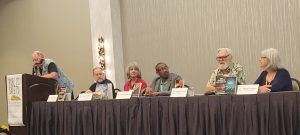
Featured Speakers
Our first featured speaker was Bob Doerr whose topic was “From OSI to NCIS to CID—Law Enforcement in the Military.” Bob’s 28-year Air Force career specializing in criminal investigations and counterintelligence brought him into close coordination with the security agencies of many countries.
Frank Scalise stepped in for a featured speaker who’d taken ill and gave a polished presentation on “What It Takes to Write a Believable and Compelling Police Procedural.” He should know; he’s written dozens.
Featured speaker Scott Ellis, an acclaimed actor and audiobook narrator, gave a helpful, detailed presentation on “From Print to Audio: Producing an Audio Book.”
Mesa, Arizona, police sergeant Joshua Lee presented “Navigating the Dark Web—What You Need to Know.” He took us there in a fascinating talk that was an audience favorite.
The presentation by award-winning author Austin Camacho, “Write Better: Draft, Rewrite, and Edit,” emphasized how authors’ work changes focus as they move through the stages of the writing process.
 And We Had Fun!
And We Had Fun!
In honor of our 20th conference, we had 20 special drawings throughout the conference, with prizes of different (and sometimes dubious) value. Our annual Writing Competition Awards Ceremony moved along nicely (the winners are detailed elsewhere on the PSWA Website), and the evening offered the added entertainment of guessing which crime fiction character our colleagues in costume portrayed. Dave Knop won a gift certificate for representing Navajo Tribal policeman Joe Leaphorn from the Tony Hillerman novels.
Summing Up
Clearly, conference-goers had the chance to hear from experts in many aspects of public safety and procedures, as well as the craft of writing, publishing, and promoting their work. They could meet industry professionals, find out what they’re looking for, ask advice, and talk about project ideas. The Orleans food service was excellent, as always, and this year Sunday morning, yours truly made available something new: a delicious array of bagels and yogurt. Many enjoyed the excellent food, and a few were even seen stuffing their pockets as they left for the airport.
Our traditional final prize drawing—a complimentary registration to next year’s PSWA Conference—means Bob Doerr will be coming for free next year!
Final Note
Well, that about covers it, except for one last thing. This was my final conference as Program Chairman. Having done the job for several years, it’s time for me to pass the baton. It’s been an honor and a privilege serving the PSWA, and, after this terrific meeting, I feel I’m going out at the top of my game. As Bob Hope used to say, thanks for the memories.
Michael A. Black
Program Chairman
Writing Contest Chair’s Report
The 2025 writing competition is over, and congratulations to all the medallion-award winners. PSWA writers are a talented group. Every year you make it more difficult for the judges to make their decisions. And a big shout-out to the judges who are also PSWA members. Without you there would be no writing competition. The local judges for the published books are also so appreciated.
Just a couple of comments I’ve heard from them about this year’s published book entries. In the fiction category, strong characters and good pacing made a winning difference. For non-fiction books, the winners achieving the right balance between narrative and story.
We had a new award category this year, the PSWA100. I loved reading these entries. It’s a challenge to write a complete piece in exactly 100 words. I’m hoping more of you will accept the challenge for next year.
In my opinion, the costume contest made the awards ceremony even better. What an imaginative group. I put on my basset hound costume in my room, paraded across the casino, and hardly anyone gave me a second glance. I used eyeshadow to darken my face, because I thought it would be easier to remove than face paint. It wasn’t.
The awards ceremony’s delicious snacks were more like a meal. You never get hungry at the PSWA conference.
Well, on to the 2026 Writing Competition. Maybe it will be your turn to win a PSWA Medallion award. You can send in your entries starting January 1, 2026.
Barbara Hodges
Writing Competition Chairperson
Member News
Members Views on the 2025 Conference
The evaluations are in! Eighteen conference attendees responded to the Board’s feedback request. These responses are invaluable in helping planners of the next meeting, so thanks! A rough calculation puts the number of first-time meeting attendees at about one in four. Several provided evaluations. They attended for many reasons—though this one may be the most important—they came because of the encouragement of other members. Thank you for that! Overwhelmingly, they plan to attend again next year.
A third of the respondents attended the workshop and gave it uniformly high ratings. Sample comments: “well worth the time,” “excellent presentations directed squarely at writers on various levels,” “informative and well presented,” “well thought out and extremely interesting.” Members liked the diversity of topics, highlighting the sessions on craft. Think about adding the workshop to your travel plans for 2026!
The conference itself garnered high praise for the quality of the speakers and panels. About the speakers, they said, “engaging and knowledgeable,” “covering diverse topics,” “helpful,” “learned something from each one.” Respondents especially called out newer topics and nuts-and-bolts presentations: the Dark Web and audiobooks and asked for more on AI.
The responses to the panels were somewhat more varied. The publisher’s panel needs to be updated, and while some respondents rated marketing and promotion content over craft, others hold the opposite view. Regarding the “business side” of authorship especially, as one respondent said, “we need ‘young blood,’” because the publishing and promotion world are rapidly changing, and there are many paths to success.
Respondents made a number of specific suggestions for topics that next year’s planners will carefully review, such as more about women in public safety, the interface with medical care, “bombs and SWAT,” and the business aspects of getting into print and being an author.
A big thank-you to everyone who responded. You gave next year’s conference planners a lot to think about.
A postscript from former PSWA president, John Schembra: “It amazes me that each year the conference is better than the previous year. I strongly encourage all of you reading this to join us for the 2026 conference! You won’t be disappointed!
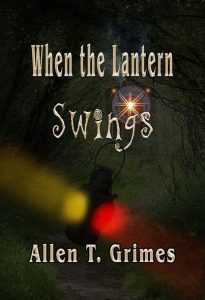
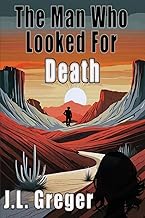 Medallion Award Winners
Medallion Award Winners
Here you can see the full list of our impressive Gold, Silver, and Bronze Medallion winners for 2025.
And here are the covers of the books that received our two special awards. First, The Marilyn Meredith Award for Excellence in Writing was given to When the Lantern Swings by Allen T. Grimes.
The Best Cover award went to The Man who Looked for Death by J.L. Greger. Writing Competition Chair Barbara Hodges had to keep quiet while the judges were assessing all the published entries to select the best cover. Unbeknownst to them, they were honing in on a winning cover that Barbara herself designed!
In Other Member News
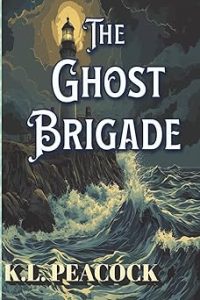 The Ghost Brigade by Kelli Peacock, published August 1, tells the tale of West Texas couple Chris and Kali Winters, who travel to picturesque mid-coast Maine for a family reunion where they can introduce their two newly adopted daughters. Instead of a joyful family occasion, they find inexplicable mysteries, and family members at odds with each other as well as the outside world. Chris and Kali face trials both on land and at sea—some brought on by nature and others by forces “far from natural.”
The Ghost Brigade by Kelli Peacock, published August 1, tells the tale of West Texas couple Chris and Kali Winters, who travel to picturesque mid-coast Maine for a family reunion where they can introduce their two newly adopted daughters. Instead of a joyful family occasion, they find inexplicable mysteries, and family members at odds with each other as well as the outside world. Chris and Kali face trials both on land and at sea—some brought on by nature and others by forces “far from natural.”
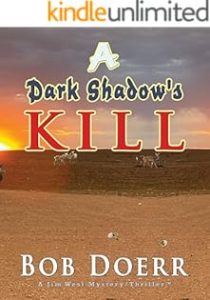 Bob Doerr’s 11th book in his Jim West series, A Dark Shadow’s Kill, is now available. Trouble knocks on Jim’s front door when teenage Jessie, asks his help in finding her mother. She’s already tried the sheriff—no luck—and Jim reluctantly agrees to help. Soon the missing person investigation becomes a murder case. When more bodies turn up, it looks like Jessie may also be a target. Can Jim save her? This book introduces a new character, Mickie, whom Bob thinks readers may want to see more of in the future.
Bob Doerr’s 11th book in his Jim West series, A Dark Shadow’s Kill, is now available. Trouble knocks on Jim’s front door when teenage Jessie, asks his help in finding her mother. She’s already tried the sheriff—no luck—and Jim reluctantly agrees to help. Soon the missing person investigation becomes a murder case. When more bodies turn up, it looks like Jessie may also be a target. Can Jim save her? This book introduces a new character, Mickie, whom Bob thinks readers may want to see more of in the future.
Member Chris Boyd writes, “I’m finally able to say I’m published! A big thanks to Mike Black who prodded and encouraged me along the way.” Chris published No God West of Fort Smith using Amazon KDP. It’s a fictionalized version of two actual murder cases heard  by Judge Isaac Parker (“The Hanging Judge”), who presided over the Indian Territory and Western Arkansas from 1875 to 1896. At his direction, more than two hundred U.S. Deputy Marshals went into the Territory after whiskey peddlers, murderers, horse thieves, and any crime committed on or by a white man or woman. “If you’ve ever seen either of the True Grit movies, you’ll know what and who I’m writing about,” Chris says.
by Judge Isaac Parker (“The Hanging Judge”), who presided over the Indian Territory and Western Arkansas from 1875 to 1896. At his direction, more than two hundred U.S. Deputy Marshals went into the Territory after whiskey peddlers, murderers, horse thieves, and any crime committed on or by a white man or woman. “If you’ve ever seen either of the True Grit movies, you’ll know what and who I’m writing about,” Chris says.
Member Terrence Dwyer has started a multi-faceted service, Legal-Eaze for Writers, that provides consultation and review of writer contracts and other legal matters authors encounter (fair use guidance, defamation inquiries, and the like). Without providing legal opinions on contracts, Legal-Eaze gives authors a good starting point for negotiation. The service also will consult on legal issues in creative work—how to portray courtroom scenes, police procedures, and correctional facilities realistically, for example. Terrence has nearly 25 years of experience in law enforcement, is a licensed attorney, and a writer himself.
The Writing Craft: Upping Your Game
AI as an Idea Generator
Wharton’s Mack Institute for Innovation Management has studied ChatGPT’s skill in generating ideas. They found that many of these ideas AI generates are fairly similar to each other, and web-aided and human-only brainstorms produced far more diverse results. So, how can you use AI for not only quantity but diversity of ideas? Here are the Institute’s tips:
You can tell the chatbot that you want options that are vastly different, and give it some guidance on how they might be different (say you want a suggestion about the plot of a PI story; you could further specify that some of the suggestions should involve a dog, or center on a jewel thief, or have a rural setting, or be set in the 1970s). You can also encourage diverse answers by asking for ten or twenty suggestions. The first few are often obvious, they say, “then it gets interesting.”
You can give it a role to play, like “you’re an editor of a crime fiction magazine . . .” Or, “you’re a guy who likes action-packed crime stories . . .”
If your query doesn’t generate a good set of ideas, try again, because AI can iterate on previous responses with your guidance. You might say, “make these bolder” or “more engaging.” The researchers said, “Don’t be scared to tell the AI that you don’t like its ideas. You can say, ‘That’s boring’ or ‘That’s dull.’ Someone even said, ‘Bro, full stop.’ You have to play with them. Don’t take them seriously at all.”
Overuse and Abuse of Words, 2nd Edition
By R. Scott Decker
The Abuse
 As I continue to write and refine my style, I find my mind visualizing the words as I form a sentence. I struggle not to use the same word twice on a page—an unfortunate habit that seems common to sportswriters. I try to stay in the active voice, vary sentence length, finish sentences in a hard consonant, and so on. My goal is that writing well becomes second nature. But it takes work.
As I continue to write and refine my style, I find my mind visualizing the words as I form a sentence. I struggle not to use the same word twice on a page—an unfortunate habit that seems common to sportswriters. I try to stay in the active voice, vary sentence length, finish sentences in a hard consonant, and so on. My goal is that writing well becomes second nature. But it takes work.
I also find that I visualize spoken words and unconsciously critique the speaker’s use of words and phrases. My mind sees the spoken words on a page. I cringe when certain phrases are used in abundance. I evaluate discussions and media commentary for what would be suitable or unsuitable in written narrative. Overuse and misuse of the King’s English has become my unexpected pet peeve.
I’m not alone. Earlier this year, two young TV announcers/anchors presented their list of overused and abused words. They put “literally” at the top. I whole-heartedly (adverb alert) concur. Unfortunately, many celebrities, including Hollywood A-listers and prime-time talk show hosts did not see the broadcast or pay attention if they did. At the top of my list of overused phrases is “moving forward” and its synonym, “going forward.” We see it everywhere—sports, politics and the nightly news. Some examples:
- Commentator during the fourth game of the Stanley Cup Finals – “We will continue to monitor COVID test positive results moving forward.” Redundant?
- Analyst during an NFL game – “Who can they count on going forward for the rest of the season?” Creative writing class needed!
- Opening of a recent Presidential Debate – “Forward-looking vision for the future.” What the……?
- A prolific and widely-read romance author penned this advice for fellow writers: “I think the biggest mistake an author makes when writing a rough draft is stopping and rereading or editing their work. The key is to keep moving forward and get the whole story out.” Could forward be left out without losing the meaning? Of course.
Second on my list is, “transparency” and its negative, “lack of transparency.” When did this word replace the more specific, “lying by omission,” “not being truthful,” “hiding the facts,” “without explanation”? Candidate Joe Biden used “transparency” more than once during his Presidential Debate. Even my personal hero, Chris Wray, former Director of the FBI, used “transparency” in his public addresses.
New Words and Terms – Stamping Your Mark on Things
We also see the use of new words, as if the tried and true won’t do. For the 21st century, we have “impactful.” And earlier this millennium, “content” to describe information. “Break it down” for explaining things. “Deeper look” has replaced closer scrutiny. “That said,” and the more formal “That being said” – what are we struggling to say?
Today’s pro-sports announcers treat us to a thesaurus of novel terms. In addition to confronting the challenges of creative reporting, we are offered “athleticism” and its masculine form, “physicality.” On any given Sunday these words are abused and over-used with every penalty on the gridiron or power play on the ice.
During a Las Vegas Springs Preserve TV ad this past summer, the narrator said, “during a rain event” to describe when it rains; and repeated it three times in one minute! And there is “price point” to describe price; “skill set” to mean skills. All at a cost of wasted oxygen. Is there no end?
We have “experience” in place of happening, encounter, incident, event, occurrence, observation, adventure, undergo, doing, seeing, feeling. Examples: Las Vegas is a “pay to play experience”; “the classic car driving experience”; “the desert experience,” “the European experience,” “Valued Life Experiences.” Recent inflation has devalued “experience” from a ten dollar word to 50 cents.
Summing Up
Good writing demands originality, whether it is a Pulitzer Prize contender, unscripted proclamations of sports announcers, scripted TV series drama, or advertisement dialogue. Writing benefits from brevity; using fewer words to say more. More often than not, this leads to faster-paced narratives. As writers, we must embrace the use of a wide and varied vocabulary. Perhaps cheating, but Microsoft Word’s thesaurus feature is a good start. I find reading the work of prominent authors invaluable, such as that of John McPhee. As I took breaks in my book-writing to read his Coming into the Country (1991), I kept a list of words he used that were unfamiliar to me. The list grew to more than a hundred by the time I finished the book. I kept a dictionary close at hand.
Publishing Tips and Travails
Some Good Publishing News?
For a change, you might think. Grove Atlantic has launched Atlantic Crime, a new crime fiction imprint led by senior editor Joe Brosnan. Grove hopes the imprint will publish 18 to 24 titles a year, which is way more than many small presses publish. They’re looking for both established authors and new ones. Alas, though, Atlantic Crime requires its authors to have an agent.
Planning a Bookstore Event
 If you have the opportunity to participate in a bookstore event—a great place to meet other authors, booksellers, and, possibly new readers—here are some planning tips from author Tessa Barbosa.
If you have the opportunity to participate in a bookstore event—a great place to meet other authors, booksellers, and, possibly new readers—here are some planning tips from author Tessa Barbosa.
- She says having another author or friend interview you works well, but don’t hesitate to go it alone. At the beginning, take a few minutes to introduce yourself and your conversation partner, and quickly tell what the book is about (you can read the blurb)
- A short reading from the book is optional, or you can simply have your partner dive right into questions prepared in advance. No partner? Cover several areas, including your writing process
- Spend the most time answering questions from the audience (assign a few questions to friends in advance, in case the audience hesitates)
- End by mentioning what’s next for you and where readers can find you online
- Is the turn-out sparse? It does happen. Tessa says “just try to have fun.” If the staff isn’t busy, talk to them too. A friend got to know the bookstore staff quite well, and the next time she had a book release, they were delighted to give her another event.
- Once the event ends, you can ask the store if they’d like you to sign their remaining stock.
If the bookstore gives you a table, be sure to bring bookmarks or other swag with your web address on it or social media links. People who take your bookmark can check you out, and find you again, even if they don’t buy the book immediately (waiting for an Amazon discount?).
Tips from Your Editor
- For my launch event at the local library, a friend sat at the entry door making sure everyone had a nametag. I was terrified I’d see someone standing in front of me, holding my book, and my mind would go blank!
- At the book-signing table I sat next to another friend, whose job it was to collect the payment and give each purchaser a post-it to write the book recipient’s name, because sometimes they are gifts. I didn’t have to handle the money (the line would have been very long); I could engage with the happy purchasers.
- If your event takes place in a bookstore, the store personnel will handle the financial transaction; for book fairs, I printed out a sheet with my PayPal address and Venmo QR code to facilitate transactions.
Why It’s So Hard to Find Small Press Books
For those of us who’ve abandoned the dream of HarperCollins and Hachette and who don’t want to go the indie route, a small press often seems a natural option. But that doesn’t mean your book will appear in a bookstore near you. As Melanie Jennings and Elizabeth Kaye Cook wrote recently in Persuasion, “Books navigate a long, complex journey before they appear on bookstore shelves, if they ever do.” In part, this is because most customers come into a store with a specific book already in mind. If no one’s asking for your book, the story won’t carry it.
It’s also difficult working with the big retail stores. According to a Publisher’s Weekly article, independent publishers complain that the biggest bricks-and-mortar chain, Barnes & Noble, is increasingly sticking with the Big Five. In interviews, a dozen well-established independent publishers say they’ve seen a drop in business with B&N under its new leadership.
Like bookstores, libraries have to offer books people already want to read. Library budgets are small. Their staffs are busy. Budget cuts to the federal Institute of Museum and Library Services mean some public libraries are buying fewer books, and, again, small and independent publishers will be the ones mostly neglected.
So, how do people hear about these great small press books? Not through reviews. The authors checked who published 52 titles on the New York Times Books home page. Only three were not from the big publishers, and none were from smaller publishers. From BookTok? Are its followers your demographic? While BookTok “has led to significant sales boosts for specific titles,” publishers now focus marketing efforts on books that perform well on that platform, which hurts midlist authors who lack that level of online engagement, says ArtsHub.
Protect Your Intellectual Property!
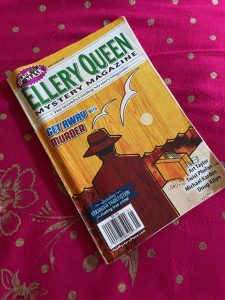 In June we wrote about how the leading mystery and sci-fi publications—including Ellery Queen and Alfred Hitchcock Mystery Magazines, where many PSWA members have sold stories—were bought by a new group called Must Read Magazines. Subscribers (and authors!) are still waiting to see what the impact will be. The staff remains the same, but the author community notes that EQMM’s former commendably quick response to submissions has slowed some. (EQMM usually responds within six weeks; AHMM takes more than a year.)
In June we wrote about how the leading mystery and sci-fi publications—including Ellery Queen and Alfred Hitchcock Mystery Magazines, where many PSWA members have sold stories—were bought by a new group called Must Read Magazines. Subscribers (and authors!) are still waiting to see what the impact will be. The staff remains the same, but the author community notes that EQMM’s former commendably quick response to submissions has slowed some. (EQMM usually responds within six weeks; AHMM takes more than a year.)
Complaints have emerged over the new contracts the magazines were sending authors, at least at first. The editor of EQMM has said she is trying to resolve the new language with the owners. The problems included a broad rights grab, including rights not normally part of a magazine contract (like merchandising and performance), as well as a “morals clause.” The rights language may have been removed by now; whereas the “morals clause” would apply to authors who have done something that would “cause disrepute in the opinion of the Publisher” (usually such shenanigans increase sales, though, don’t they?).
Also, the new contract language would have denied authors’ moral rights to their work (this is NOT the same as the morals clause, although users of at least one short story listserv provided some amusing examples of conflating the two and thus talking past each other). The moral right to your work includes the right to have it attributed to you and not to have it altered in any way damaging to you or the work itself. Moral rights are more an issue abroad, because the US has other laws that cover this, but if the publisher sold your work into a foreign market, it could become germane. Must Read expressly states its intentions to publish internationally, by the way. This provision reportedly will be revised.
While the last word on Must Read’s new contracts has not yet been written, it is more important than ever that you read any contract carefully. As of mid-summer, authors were reporting lengthy and frustrating negotiations over points in the contract “even in areas where other authors have already gotten them to agree to change something.” According to Victoria Strauss, author advocate behind the Writer Beware! blog, “Must Read has been willing to relinquish some of those rights to writers who ask—but as always with publishing contracts, many writers don’t know they can ask, or are willing to accept author-unfriendly clauses for the sake of a prestigious publishing credit.” This link will take you to a model short story contract.
“The Cruelty—and Possibilities—of 21st Century Book Promotion”
 Michael Castleman’s article (title above) in the recent Author’s Guild Bulletin has sparked much discussion among AG members. A year ago, he published The Untold Story of Books: A Writer’s History of Book Publishing. He spent $16,000 promoting it, and it’s still #3 at Amazon among books about the book publishing industry. This article tells what he did and why.
Michael Castleman’s article (title above) in the recent Author’s Guild Bulletin has sparked much discussion among AG members. A year ago, he published The Untold Story of Books: A Writer’s History of Book Publishing. He spent $16,000 promoting it, and it’s still #3 at Amazon among books about the book publishing industry. This article tells what he did and why.
Why? He provides a trove of data to explain. He says that during the 20th century US publishers released 2.5 million titles. Now, with self-publishing and other mechanisms, that many books are released every year. (Many AG readers consider that an under-estimate.) Only one book in 10,000 becomes what you’d call a best-seller, and matter how much promotion an author does, it’s hard to get traction. He figures new releases sell, on average, around 150 copies, and about 80 percent sell fewer than 100 copies. On the plus side, with digital printing, books don’t go out of print, and authors have a longer timeframe to promote them.
Castleman has several tips on how to manage this difficult reality. First: regarding social media. While publishers want authors to have a “platform,” he says “your family, friends, and acquaintances are your best (sales) prospects. The people you know, who know you, are your most likely buyers, not casual eyeballs on Instagram.” Topping the list of factors influencing book purchases is always recommendations from family and friends. Implore them to pre-order, Castleman says. That may encourage your publisher or distributor to put copies into bookstores. Book sales are heaviest during the four weeks from Thanksgiving to Christmas, and that’s when your “promotion is most likely to sell product.”
Blurbs don’t sell many books, despite authors’ efforts to get good ones. In fact, some publishers (notably, Simon & Schuster) have stopped using blurbs entirely. Cull good quotes from blogger reviews or online reviews. They qualify as “editorial reviews,” whereas friend and family opinions (“customer reviews”) do not. Use them on your book’s Amazon and Bookshop pages, and include them in your media kit and other promotions. You can almost forget about getting a review in print. They’re a vanishing species. In early August, the Associated Press (which has a daily reach of 4 billion people) announced the end of its regular book reviews.
If you use a publicist, find one who’ll develop a coherent strategy. Scattershot emails at huge lists are pretty much useless, Castleman says.
Strategies that one author swears by—Amazon ads, Facebook ads, web sites, TikTok—worked well initially, but now are swamped with competing products (books!) and less effective. In your editor’s opinion, you have to work out an approach that is comfortable for you and stick with it. No one strategy works for every author, and no one author can do it all.
 Editor’s Turn
Editor’s Turn
It’s hard to believe almost 26 years have passed since 9/11. Hundreds of memorials have been established around the country to honor the victims of the attack, including and the public safety professionals who tried to save them. One of these memorials is right near me on the campus of Princeton University. It honors the school’s 14 alumni from many disciplines who died that day. Their names are read every anniversary followed by the tolling of the 9/11 memorial bell.
In a memorial service for them soon after the attack, the university’s president said, “We all have a responsibility … to prove what we know to be true: that love is stronger than hate; that justice is stronger than injustice; that democracy is stronger than despotism; and that freedom does allow for the fullest flowering of the human spirit.”